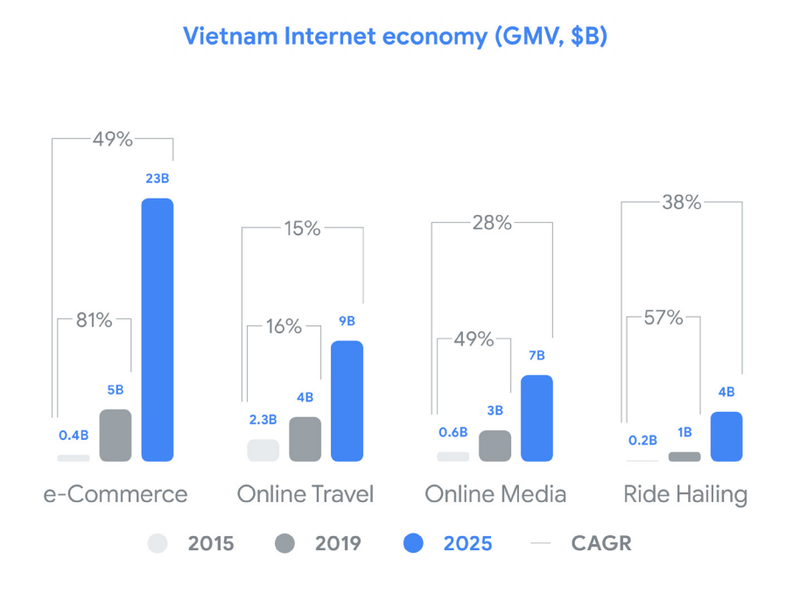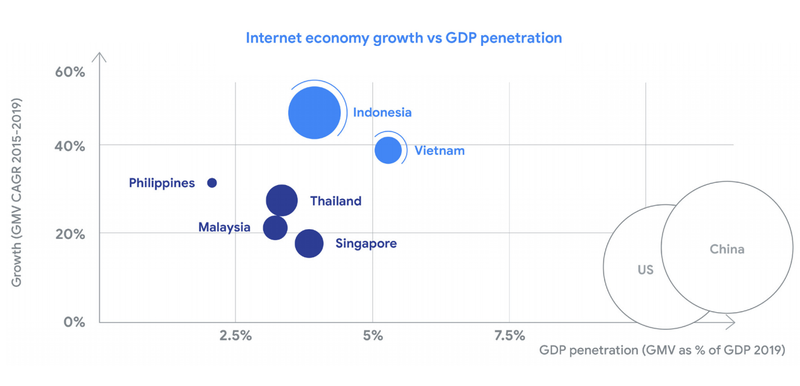Vietnam targets to have 100,000 digital firms by 2030
In 2020, Vietnam would announce the strategy of national digital transformation, marking the beginning of a comprehensive and inclusive switchover process nationwide.
Vietnam targets to have 100,000 digital firms by 2030, double the current 50,000, while the digital economy would account for 30% of the country’s GDP, the governmental portal reported.
The target is set in the prime minister’s Directive No.01, the first of its kind in 2020, aiming to promote the development of digital firms in Vietnam, build smart cities, e-government and expand technological advances in every socio-economic aspect towards national digital transformation.
“The move would help realize Vietnam’s desire to become a prosperous nation with a 100-million population market, laying a strong foundation for Vietnamese digital firms to compete globally,” said PM Nguyen Xuan Phuc in the directive.
|
Statistics from the Ministry of Information and Communications (MIC) said the IT sector is maintaining an annual growth rate of 10%, thanks to great contributions of digital firms.
As of the fourth quarter of 2019, Vietnam’s average broadband download speed was 29.08 megabytes per second (Mbps), fast approaching the world’s average of 30.93 Mbps.
The MIC is submitting to the PM plans to phase out the obsolete 2G network by 2022.
A research report by Google, Temasek and Bain said Vietnam’s Internet economy is booming, as it reached US$12 billion in 2019 on a 38% annualized growth rate since 2015, and is projected to increase to US$43 billion by 2025 across the online travel, e-Commerce, online media and ride hailing sectors.
With the gross merchandise value (GMV) of internet economy set to account for over 5% of the country’s GDP in 2019, Vietnam is emerging as the most digital of all economies in ASEAN, the report stated.
In the Southeast Asian region, Vietnam and Indonesia are the two pacesetters in the region in terms of internet economy growth, standing in excess of 40% per year against the regional average of 33%.
Hanoi and Ho Chi Minh City are among seven major cities with high growth rate of internet economy in the region.
These dynamics are unlocking opportunities for entrepreneurial Vietnamese small and medium-sized ventures, which have jumped onboard the Internet economy to do business.
|
According to the report, investor confidence in Vietnam, the third most-funded economy in the region after Indonesia and Singapore, is on the rise. Over the last four years, Vietnam’s Internet economy has attracted almost US$1 billion in funding, with 2019 in line to be a record year.
Additionally, Vietnam’s Global Innovation Index (GII) has been increasing over the last few years, ranking 42nd out of 129 countries and territories in 2019, up three places against the previous year, and third in ASEAN, behind Singapore and Malaysia.
Under the government’s resolution No.2 on improving the business environment and national competitiveness, the Vietnamese government also focuses on facilitating e-payment, promoting online public services and innovation startups, which are considered key measures to help Vietnam speed up the process of digital transformation, according to the Vietnam Chamber of Commerce and Industry (VCCI).
Under Directive No.01, PM Phuc said digital switchover would help create a new room for the development of digital economy and society, as well as e-government.
More importantly, this would open up opportunities for Vietnam to catch up with developed countries, especially those which are just at the start of digital transformation process.
Phuc requested Vietnamese digital firms to take the pioneering role and create breakthroughs in realizing the “Make in Vietnam” strategy, meaning all processes from creation, design and production would take place right in Vietnam.
This would be the way forward to turn Vietnam into an advanced industrial nation and become a high-income country by 2045, Phuc said.
In 2020, Vietnam would announce the strategy of national digital transformation, marking the beginning of a comprehensive and inclusive switchover process.
A study suggested by 2030, Vietnam’s participation in the Fourth Industrial Revolution is projected to boost economic growth by an additional US$28.5 – 62.1 billion.














